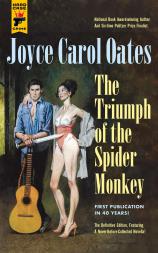The Triumph of the Spider Monkey
Review
The Triumph of the Spider Monkey
Readers and authors alike are in uniform awe of Joyce Carol Oates. Though her writing career is well into its sixth decade, she shows no signs of slowing down. What is equally remarkable is that her work eludes easy classification. One is tempted to slip this or that title (or short story) into “horror,” “mystery,” “romance” or even “supernatural,” but the edges constantly and consistently blur. The theme that runs through all of her stories and novels, however, is the dark side of the human psyche in its manifestations and consequences.
It is difficult (though not impossible) to find a complete list of Oates’ works, given her prolific output, which makes the publication of THE TRIUMPH OF THE SPIDER MONKEY all the more remarkable. This new edition consists of both the title novel and a related novella, “Love, Careless Love.” The former has been out of print for over 40 years; the latter previously saw the light of day in a literary journal of limited circulation at a similarly removed distance. Both are as dark as night in atmosphere and subject matter.
"Oates digs so deeply into the psyche of the murderous personality that it makes for rough reading in parts, but the subject matter is not and should not be sacrificed on the altar of the reader’s comfort zone."
THE TRIUMPH OF THE SPIDER MONKEY is the story of Bobbie Gotteson, a singer-songwriter who is a legend in his own disturbed and angry mind. Most of the narrative is given over to him, with some interludes consisting of interview transcripts and newspaper articles. The reader learns that, when he was just a baby, Gotteson was discovered after being abandoned in a bus station locker. His childhood was spent being transferred to and from foster homes and detention centers, where the abuse was varied but almost always constant. Along the way, he learned how to play the guitar and wrote songs of a sort.
Gotteson’s career, if one could call it that, seems to consist of a cycle of orbiting around or near this or that artist who misappropriated his work and achieved success with it, always without recognition and/or financial compensation accruing to Gotteson himself. At the same time, he was venting his anger with a series of shocking acts of violence. These stopped only when he was apprehended following a mass killing from which one of his intended victims escaped, though the psychological damage to the woman remained. Her story is told in “Love, Careless Love,” which demonstrates the ripple effect that these types of crimes visit upon the victims and those around them.
The parallels between Gotteson and Charles Manson (and, to a lesser extent, Richard Speck) might not be immediately obvious to those who aren’t aware of Manson’s tenuous ties to the California music scene, but they are there and all the more chilling for it. Oates digs so deeply into the psyche of the murderous personality that it makes for rough reading in parts, but the subject matter is not and should not be sacrificed on the altar of the reader’s comfort zone.
That said, this is not a volume that one who has not read Oates’ work should reach for as an introduction. Its publication, though, is still important and ultimately indispensable for anyone who is even marginally familiar with Oates, one of the great literary voices of the 20th and 21st centuries.
Reviewed by Joe Hartlaub on July 26, 2019




